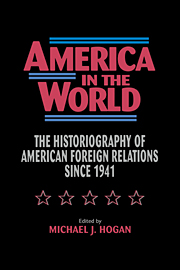Book contents
- Frontmatter
- Contents
- Preface
- The Authors
- Part One The State of the Art
- 1 State of the Art: An Introduction
- 2 “Revising Postrevisionism,” Or, The Poverty of Theory in Diplomatic History
- 3 New Approaches, Old Interpretations, and Prospective Reconfigurations
- 4 The Long Crisis in U.S. Diplomatic History: Coming to Closure
- 5 Commentaries
- Part Two The Historiography of American Foreign Relations since 1941
- Index
4 - The Long Crisis in U.S. Diplomatic History: Coming to Closure
Published online by Cambridge University Press: 05 June 2012
- Frontmatter
- Contents
- Preface
- The Authors
- Part One The State of the Art
- 1 State of the Art: An Introduction
- 2 “Revising Postrevisionism,” Or, The Poverty of Theory in Diplomatic History
- 3 New Approaches, Old Interpretations, and Prospective Reconfigurations
- 4 The Long Crisis in U.S. Diplomatic History: Coming to Closure
- 5 Commentaries
- Part Two The Historiography of American Foreign Relations since 1941
- Index
Summary
Gordon A. Craig recently warned “historians are really more interesting when they are writing history than when they are talking about it.” Craig is undoubtedly right, but diplomatic historians, gripped by a long crisis of confidence, have had little choice.
Our remarkably sustained exercise in self-reflection and self-criticism spanning the last two decades was a defensive response to the pointed criticism, if not wounding indifference, directed at diplomatic topics by a historical profession in transformation. Social historians flogged diplomatic history, and political history more generally, for seemingly old-fashioned methods and concerns, especially the tendency to identify with the political elite and to ignore the links between policy and the patterns of privilege and power within American society and culture. The new cultural history added its own charges: epistemological naiveté and an impoverished sense of the importance of language for an understanding of both historical evidence and historians' discourse. Those with a strong theoretical bent consigned diplomatic historians to the role of the hewers-of-wood and the drawers-of-water in their world of international relations theory. The historians were to toil in the archives, constructing detailed case studies on which real social scientists were to raise grand explanatory structures that would account for the enduring patterns in international relations and that would command the respect of policymakers.
The steady reflection on the state of the field, which has built to a crescendo in the last year or so, has been beneficial.
- Type
- Chapter
- Information
- America in the WorldThe Historiography of US Foreign Relations since 1941, pp. 93 - 126Publisher: Cambridge University PressPrint publication year: 1996



